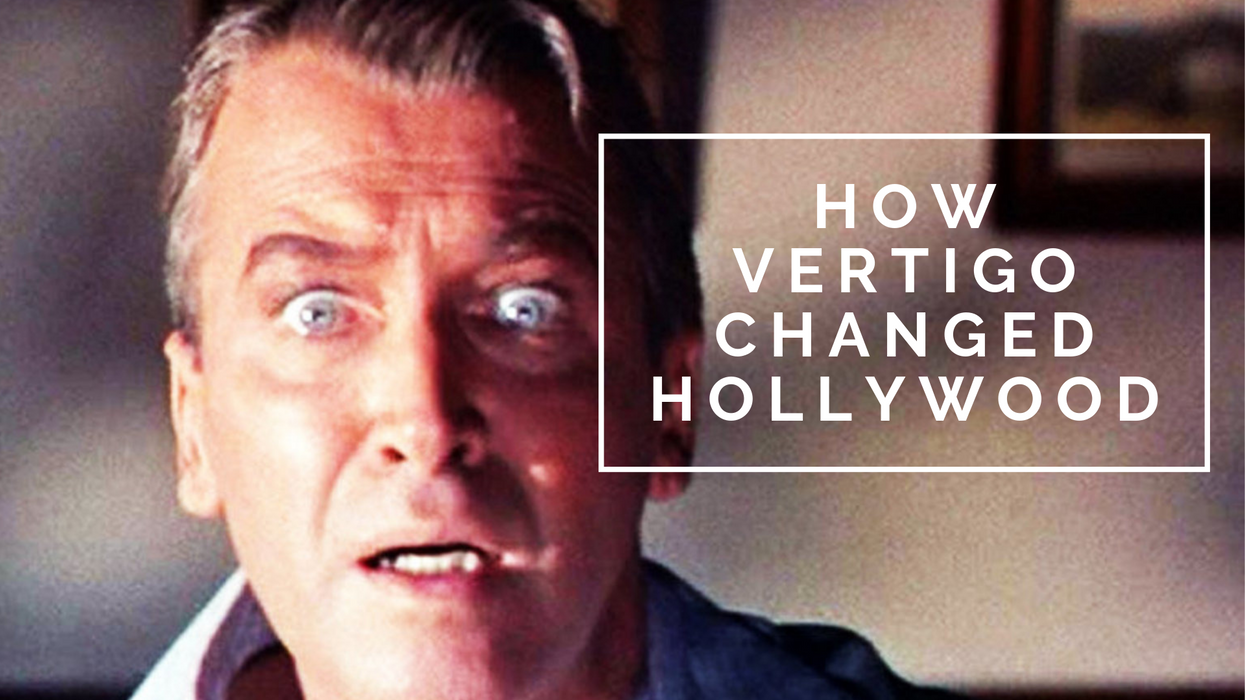How 'Vertigo' Changed Hollywood (Without Getting Enough Credit)
Vertigo was only received in a lukewarm fashion when it debuted, but now we think it's one of the best movies of all time. What happened?

Alfred Hitchcock is a true master and one of the greatest directors of all time. His work has shaped everything from Jordan Peele's Us to M. Night Shyamalan's Sixth Sense. There's no doubt Hitch left an indelible mark on Hollywood, especially thanks to his seminal films Psycho, The Birds, and Rear Window.
When people bring up Vertigo, they usually refer to it as "that weird one," at least that's what my friend said when I mentioned writing this article.
Today, Vertigo is heralded as one of the best and most important movies ever made, but when it came out, it received mixed reviews. In fact, Variety said "Vertigo is prime though uneven Hitchcock and with the potent marquee combination of James Stewart and Kim Novak should prove to be a highly profitable enterprise at the box office."
So how did Vertigo become one of the most celebrated movies of all time?
The History of Vertigo
Vertigo was released in 1958. The movie starred Jimmy Stewart and Kim Novak. The movie was thrilling and weird. It came with a Bernard Herrman score and had a poster done by Saul Bass.

Even though its reception was mediocre, it made $7,705,225 at the domestic box office according to Box Office Mojo. It was a movie that confounded audiences with its dark morals and confusing twists. But while Vertigo helped keep Alfred Hitchcock the most famous director in Hollywood, it was also part of a five-picture deal he made with Paramount that allowed him to retain the rights to his films.
That meant from around 1960 to 1980 almost no one saw Vertigo. That meant that a movie that was ushering in changes across Hollywood and influencing every contemporary director was also not being seen. Sure, you could watch the movies it paved the way for, but you couldn't see the film that built the road that others traveled.
In fact, if you even watched to catch a glimpse of the movie you had to ask Hitch directly. And he said no to lots of people. Even Jimmy Stewart couldn't get him to show it.
But Hitch didn't live forever. He died in 1980 and a few years after his death audiences were allowed to return to this masterpiece. A whole new generation got to see the picture and experience the complex love story about stalking and infatuation.
How did Vertigo change Hollywood?
The American New Wave came to life in the 1960s, but it really started in '58 with Vertigo. Its artfulness and craft set it apart from every other movie released at the time. It was tragic and a downer. Endlessly rewatchable and completely new every time you see it. The color, composition, and even movements like the dolly zoom all were used to perfection within the movie.
These were all director flourishes, and they solidified the narrative that the director was the true author of any film. This auteur theory changed the way Hollywood pivoted as well. They realized directors with a signature style could be a marketing tool unto themselves. And Film theorists decided that movies with these complex emotions and moral issues were worth studying.
Vertigo helped Hollywood be taken seriously, helped movies be considered art AND entertainment, and places the weight of the world on every director's shoulders.
The movie also changed the way we dealt with endings.
Vertigo's ending
In the final scene, Scottie (James Stewart) has discovered that Judy (Kim Novak) is actually Madeleine and was part of a murder plot. To cure himself of his vertigo, Scottie forces the duplicitous Judy to reenact the murder. Judy resists all the way up the stairs, even telling Scottie she loves him. Then, suddenly, a nun appears behind Judy. The appearance of the nun scares Judy backward and she falls to her death. Vertigo ends with Scottie standing, frozen, inches from the precipice, looking down, once again, at the dead body of the woman he loved.
Is this punishment for Judy's guilt, or for Scottie's lust? Or both?
Does the nun's appearance suggest God's will, or is it just a coincidence given the location?
There are lots of things to unpack in Vertigo's ending, but the one constant is that it got people talking.
This maneuver, to end this way, was purely a director decision. With Hitchcock being seen as the author of the film, the dissection of Vertigo's ending also became a dissection of Hitchcock himself. Was this about his lust for actresses, his peeping ways?
Or was it about career anxiety and the fear audiences would see his true self and love him less?
These big questions ushered in a new era of the way we talk about film. These ambiguous endings were profitable and plausible.
And Hollywood had changed forever.
What's next? 'Pulp Fiction' Gets Deconstructed!
Quentin Tarantino has made some spectacular films during his 24-year career, but none have been more talked about, dissected, and studied than Pulp Fiction. If you're a fan of Tarantino's work you may be slightly disappointed by his reluctance to do any commentary tracks for his own films (strange, considering how talkative he is). You're kind of relegated to gather whichever interviews or film critiques you can find on the internet, but if you've been looking for something along the lines of a traditional commentary, you're finally in luck.
















